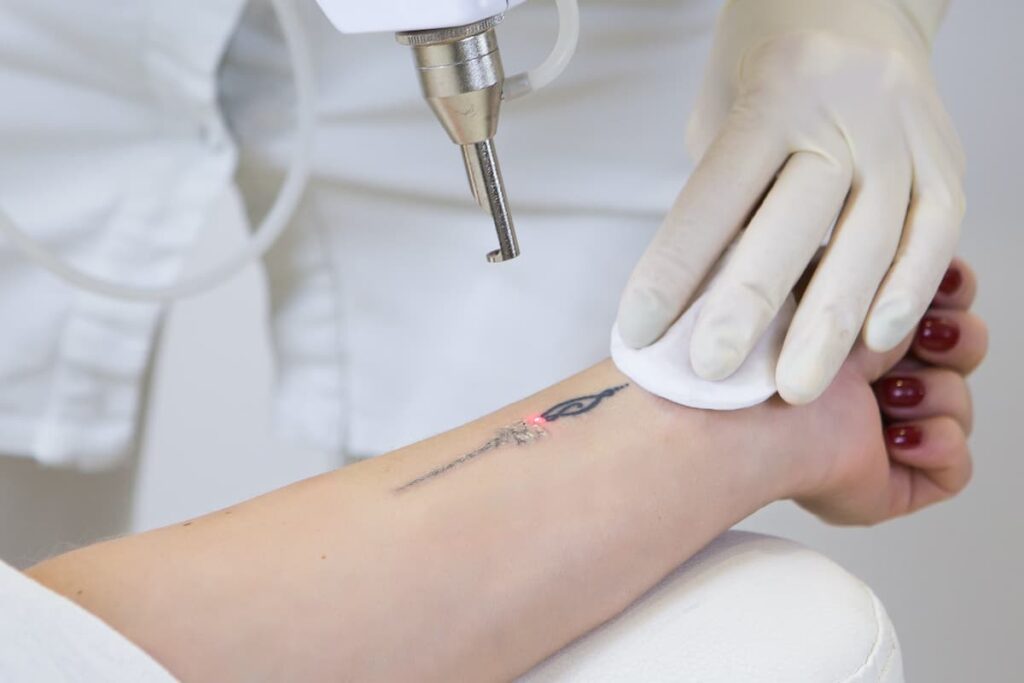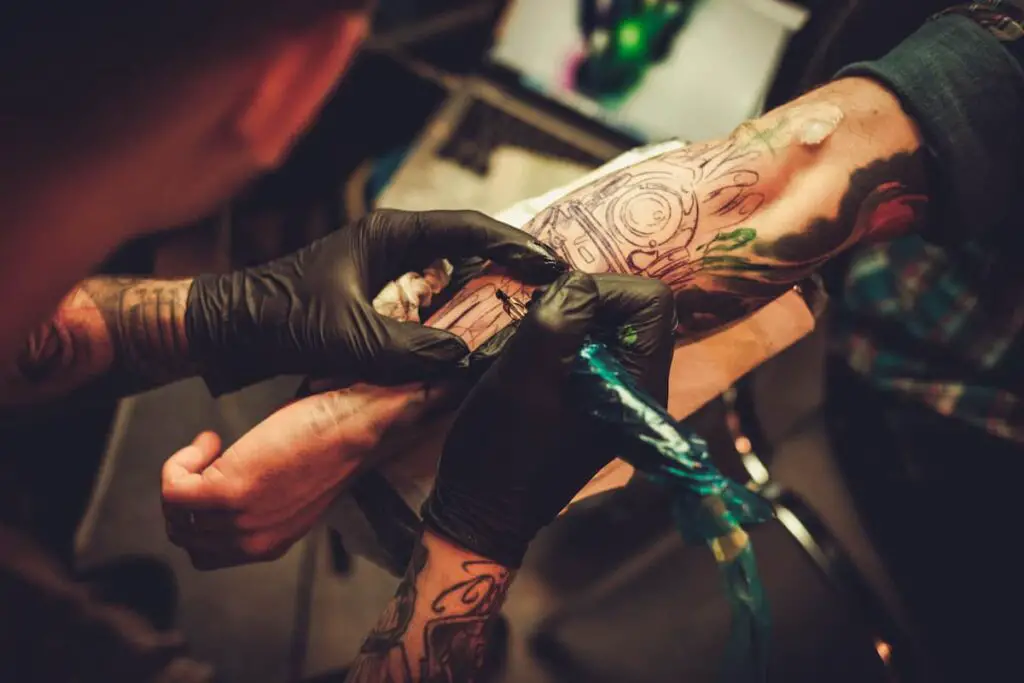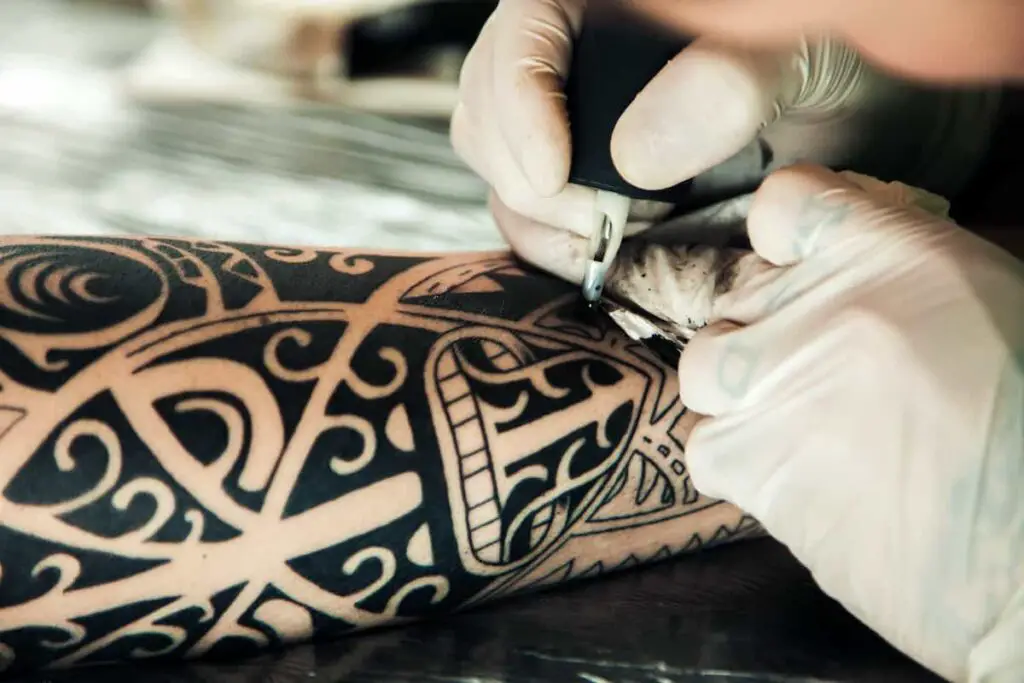Over the last ten years, tattoos have hit new heights of popularity. Today you’ll find tattoos are popular with everyone from Generation Z to Baby Boomers!
With that, the demand for talented tattoo artists has also risen.
In this post, I’ll share how to become a tattoo artist and everything you need to get started. So if you want to find out if you have what it takes to join this creative industry, read on!
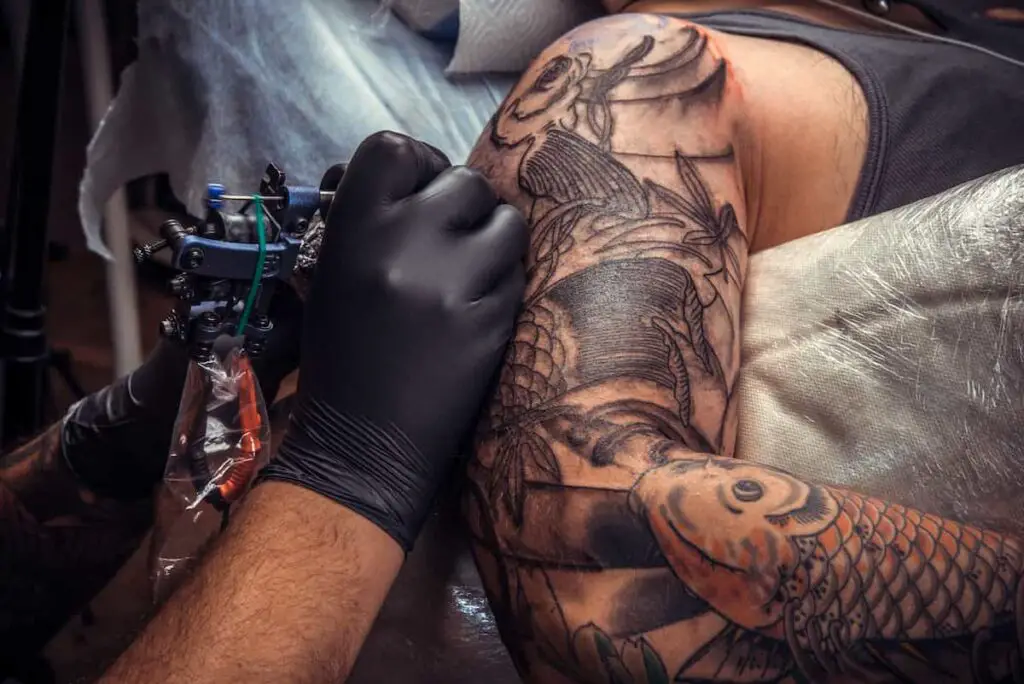
Why Become A Tattoo Artist
Tattooing is not about money, though the pay can be amazing if you’re good and in demand.
Tattooing is about self-expression, art, exploration, and more. It means something different to everyone. As a tattoo artist, it’s your job to help clients express themselves in the way they want. You must also learn to incorporate your self-expression as an artist into theirs seamlessly.
Becoming a tattoo artist can be a rewarding career for those with an eye for art and a passion for body modification. But it takes more than artistic ability to become a successful professional in this field. Aspiring tattooists must undergo long apprenticeships, master their skills and techniques, and understand the intricacies of licensing and safety.
Benefits of Being a Tattoo Artist
The benefits of being a tattoo artist are endless! You get to create art that will last forever on someone’s skin and make a living doing something you’re passionate about.
As a tattoo artist, you’ll have the opportunity to meet and interact with new people from all walks of life and build lasting relationships with clients. Your creativity is rewarded since each custom artwork piece requires artistic skill and commitment.
On top of all that, there’s the potential for growth within the industry—from managing your own shop to becoming an instructor or even collaborating with other artists. Put simply, being a tattoo artist can be incredibly rewarding in so many ways.
Apprenticeship Basics
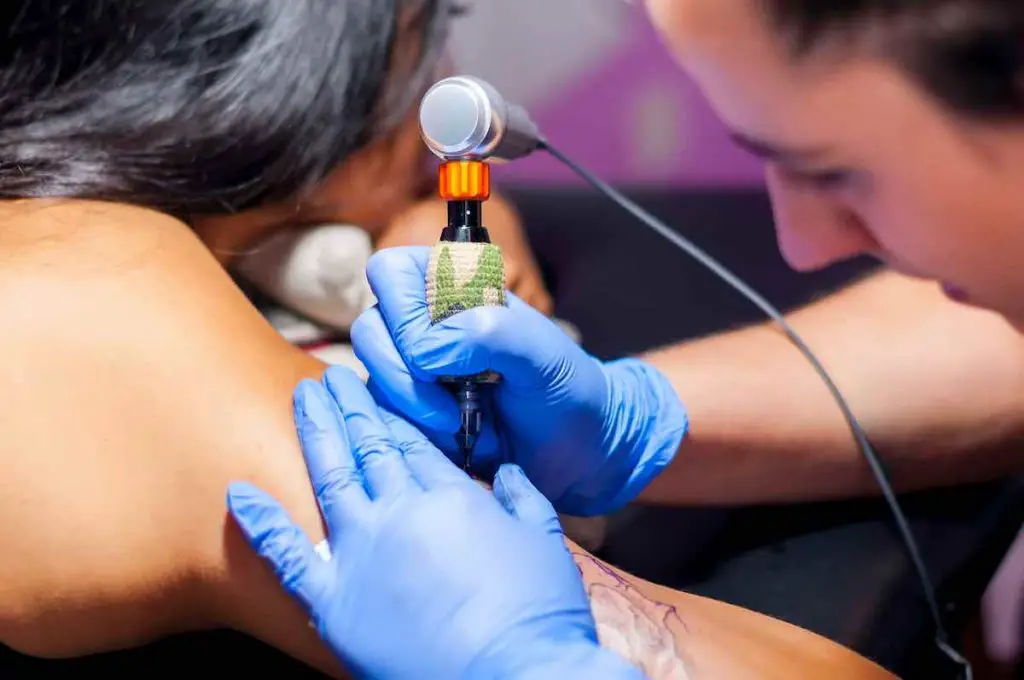
If you’re looking to become a tattoo artist, it’s essential to understand the basics of apprenticeship. An apprenticeship is an on-the-job training program that allows aspiring tattoo artists to learn the craft from experienced professionals.
During this process, you will be trained in all aspects of the profession—from design and sterilization procedures to client management and aftercare instructions. It typically takes six months to two years for an apprentice to become proficient enough at tattooing to start taking their own clients.
Finding a suitable tattoo apprenticeship can be challenging, as many shops are selective about who they take on. Most require applicants to have prior experience with art or drawing. They will also ask that you provide examples of your work. This process ensures applicants have the necessary skills for success in the field. Additionally, many prospective apprentices must complete some basic medical training before being accepted.
A tattoo artist apprenticeship is an excellent way to obtain valuable experience and knowledge without incurring high upfront financial costs. It also presents numerous opportunities in the industry, including securing permanent employment or opening a shop of your own!
To master the art and craft of tattooing, undertaking an apprenticeship is the most effective way. With commitment and effort, you can rapidly gain enough proficiency to handle your own clientele. Now that you understand apprenticeship let’s discuss finding one that’s right for you.
Finding Apprenticeships Opportunities
Although finding an apprenticeship may feel overwhelming, there are some simple steps you can take. Finding the right opening to become a tattoo artist is worth the effort!
Start by exploring local tattoo shops and studios specializing in the type and style of work you are interested in. After identifying some possible prospects, contact them directly about their application process or tattoo apprenticeship program.
Online resources, including job boards and social media platforms like Instagram and Facebook, provide opportunities to connect with other artists who could assist you in finding an apprenticeship.
Organizations like Professional Tattoo Apprenticeships offer extensive programs to aid individuals aspiring to become tattooists. They provide access to experienced professionals who can guide you through the process, from finding a suitable shop to learning the basics of tattooing.
No matter what route you take when looking for an apprenticeship opportunity, do your research, ask questions, and make sure you feel comfortable with your decision before committing.
Typical Responsibilities of a Tattoo Artist Apprentice
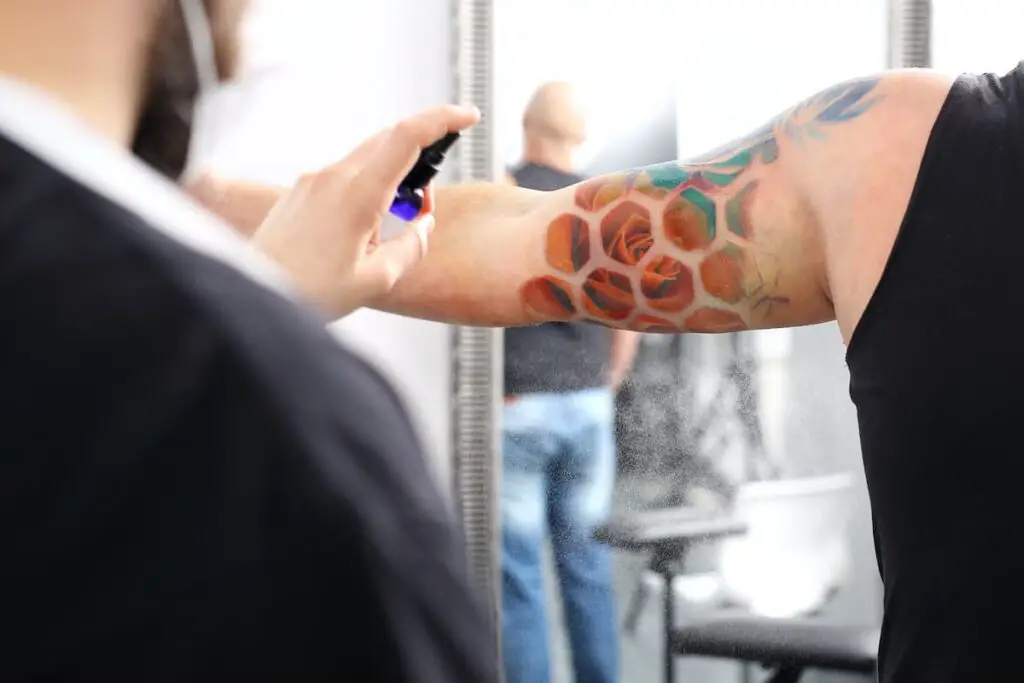
As an apprentice, you’ll have the opportunity to become well-versed in all aspects of tattooing. These include learning to properly set up a workstation, sterilize equipment and materials, prepare skin for tattooing, and apply the ink.
You’ll also gain valuable experience in customer service as you’ll interact with clients throughout the process. Additionally, you may be asked to help out around the shop – from organizing supplies to cleaning up after services are complete.
The apprenticeship process is highly individualized, depending on the shop and artist you work with. Most programs will start slow and gradually increase in intensity as you learn more about the craft. You may find yourself shadowing experienced artists before eventually being allowed to practice independently.
As your skills grow, so too will your responsibilities. Don’t forget to take things slow and focus on mastering each step before moving on to the next one!
Duration of Apprenticeships
The duration of an apprenticeship varies depending on the artist and shop you are working with. Generally, it takes a minimum of two years to become a fully-fledged tattoo artist, so it’s important to be patient and take your time to learn everything properly.
It’s also important to understand that there is no one-size-fits-all approach. Some artists may require more time than others, as they may have different techniques or styles they prefer their apprentices to master. Shops may offer longer apprenticeships to provide their apprentices with more comprehensive training.
No matter the situation, it’s best to discuss your goals and expectations with your mentor or shop owner so that you can set yourself up for success.
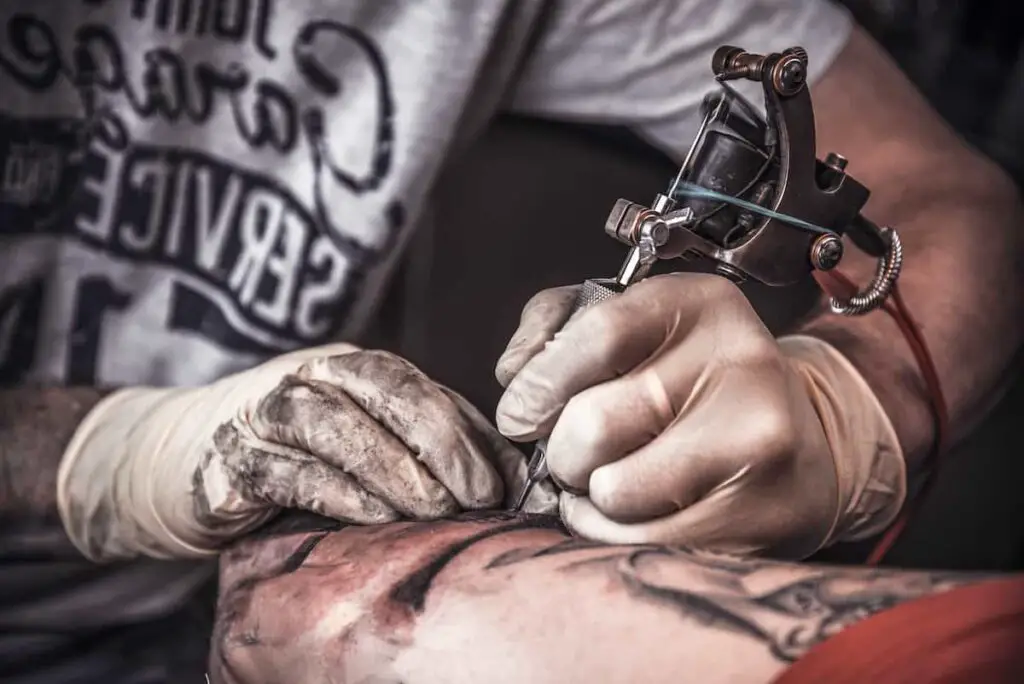
Costs & Fees Associated With Tattoo Apprenticeships
The cost of becoming a tattoo artist through an apprenticeship can vary greatly depending on the shop and location you choose. Generally speaking, there are fees associated with receiving your training. These may include supplies and tools, as well as any other costs related to learning, such as transportation and lodging, if necessary.
Depending on the shop, you may be required to pay for additional classes or workshops to further your education. Depending on the shop, you may be required to pay tuition or an apprenticeship fee for the duration of your training. Ultimately, discussing these costs upfront is best to prepare yourself financially for this commitment adequately.
Developing Professional Skills & Artistic Ability
To become a successful tattoo artist, having the necessary technical skills and developing your artistic ability and professional attitude is important. Familiarize yourself with the different tattooing techniques to choose the one that works best for you. Learning about sanitation and hygiene protocols is paramount for any tattoo artist to ensure a clean and safe environment for you and your client.
A professional demeanor is key to being taken seriously by clients. You should be punctual and well-prepared while also demonstrating excellent communication skills. Developing your artistic style is important to stand out as a unique tattoo artist. Don’t be afraid to take risks with your design choices.
By understanding the fundamentals of tattooing, you can take the first steps toward becoming an exceptional tattoo artist. Now, let’s take your skills to the next level and dive into some basic drawing skills that will help to refine your artistry.
Practice Basic Drawing Skills
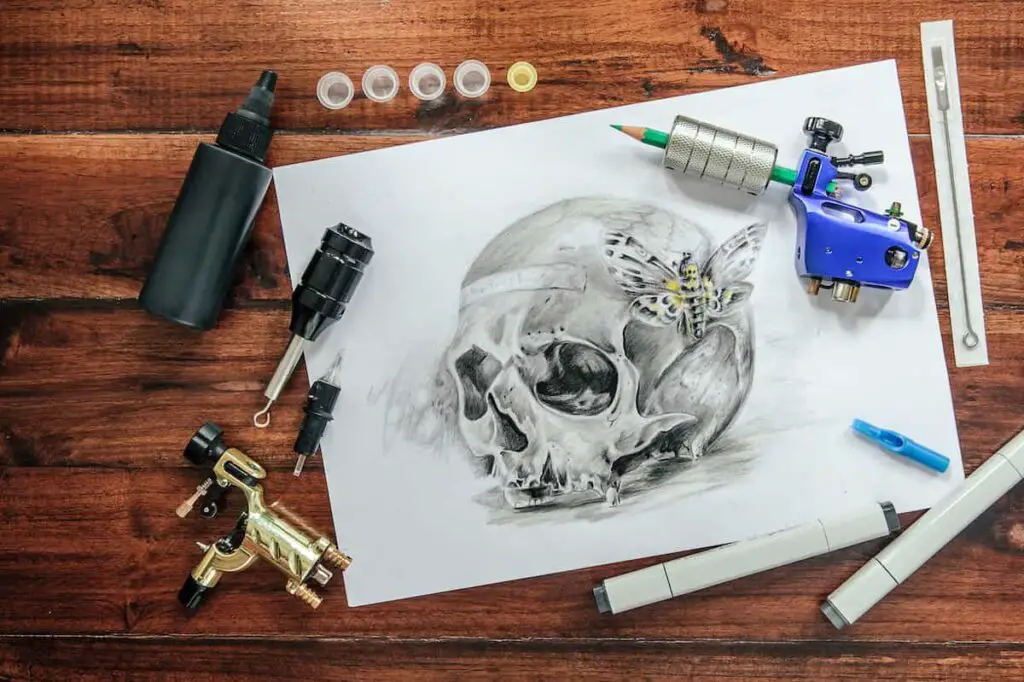
Practicing basic drawing skills is essential to become a successful tattoo artist. Drawing is the foundation of all art and can help you develop your creative ideas into a tangible design. Practice sketching subjects from life, such as animals, people, or plants, to get comfortable with replicating what you see.
You can also draw from photographs and reference books to practice creating realistic images. Focus on refining your line work and shading techniques by drawing still-life objects like fruits or flowers. These exercises will help you hone the details of a beautiful tattoo design.
And don’t be afraid to experiment with colors – explore how different tones interact together and how they add depth to your artwork.
Practice Flawless Tracing
Flawless tracing is an essential skill for any aspiring tattoo artist. Achieving this requires patience and precision, and practice makes perfect. Start with simple shapes and lines like circles, squares, and triangles. As you trace, these exercises will help you become comfortable with your hand and arm movement.
Once you feel confident in your technique, move on to more intricate designs like flowers or animals. When tracing a complex configuration, break it down into smaller sections to make it easier to follow. Maintain a steady hand and ensure uniformity and smoothness in every line, from start to finish. With sufficient practice, you can produce impeccable tattoos that your clients will love.
Learning About the Tattoo Machine & Equipment
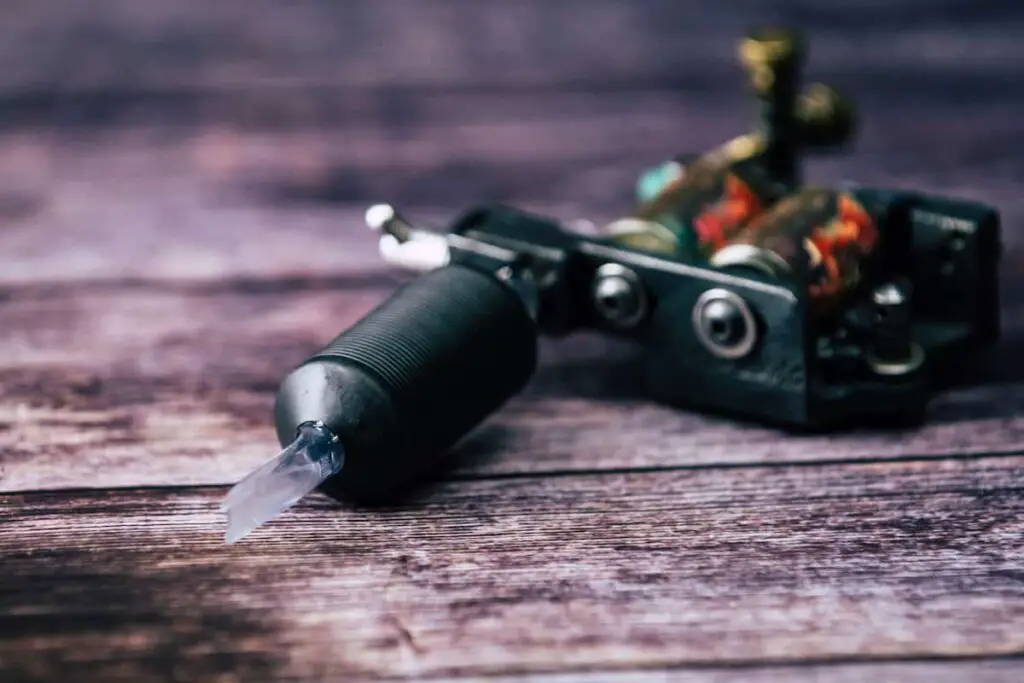
Before picking up a tattoo machine, acquainting yourself with the equipment is essential. The tattoo machine is of utmost importance and operates like a sewing machine. Its function is to implant ink into the skin to form a design. The device is electrically powered and consists of two needles that move up and down rapidly, ensuring accuracy and precision.
Aside from the machine, other essential items such as disposable needles, ink, rubber gloves, paper towels, stencils, and Vaseline are necessary. Once you have gathered your supplies, take time to get comfortable with each item before starting any tattoos. That way, you’ll be prepared when it comes time to put a needle to skin.
Mastering Styles & Techniques
Once you’ve got the basics down, it’s time to start mastering styles and techniques. Different tattoo artists have their signature flair, so practicing other methods is necessary until you find your own.
There are various tattooing styles, such as traditional, blackwork, geometric, watercolor, and more. Study existing artworks or watch tutorials online to get the hang of each one.
You should also practice and perfect all sorts of shading techniques. Dot work and crosshatching, for example, will give your tattoos depth and dimension. The more variation you can offer your clients, the more desirable your art will be.
Building a Portfolio & Networking With Other Artists
Building a portfolio and networking with other artists is important as you become more comfortable with your skills. Your portfolio is a collection of tattoos that you can show potential clients to gain exposure and book appointments.
A portfolio of work is crucial when advertising yourself as a tattoo artist. When building your portfolio, take high-quality photos of each piece. Use multiple angles and good lighting to showcase the detail and vibrancy of your work.
Like any career, networking is key to finding apprenticeships or job opportunities as a tattoo artist. Attend local conventions, join online forums, and follow other tattoo artists on social media. Make these connections within the industry and learn from experienced professionals. Building relationships with people with the same passion for art as you is essential to becoming a successful tattoo artist.
Running Your Own Studio or Shop
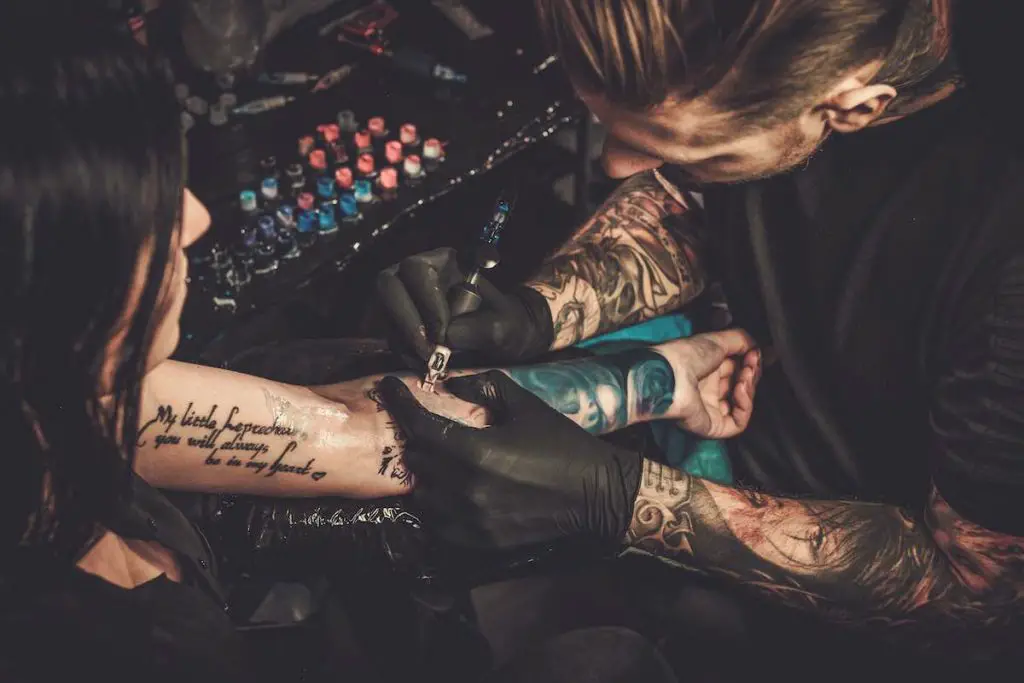
Running your own studio or shop is a great way to take your tattoo artistry to the next level. Before you can start inking your clients, however, there are some critical steps you’ll need to take.
First and foremost, you’ll need to ensure that your workspace meets sanitation standards. Keep your studio clean and organized, and invest in high-quality sterilization equipment for needles and other tools. This is especially important when meeting health regulations and protecting yourself and your clients from any potential risks.
You’ll also want to research local business licensing requirements and ensure you comply with all necessary paperwork before opening up shop. If you plan to hire additional staff members, look into any relevant labor laws or regulations.
What payment options do you want to accept? Will your shop be cash only? How about credit cards or Venmo? Be sure to set prices for the services you offer. Once everything is done, it’s time to open up shop.
Succeeding as a Professional Tattoo Artist
As a proficient tattoo artist, having a distinctive style that distinguishes you from other artists is vital. Dedicate time to practicing and exploring different techniques to cultivate your recognizable aesthetic. A niche style will enable you to stand out among competitors and earn renown within the industry.
Stay up-to-date on the latest trends in the tattoo industry. Follow popular artists on social media, read industry-related blogs and magazines, and interact with other professionals to discover new advancements in technology or techniques that can elevate your skills. By considering these suggestions, you can set yourself on the path to success as a professional tattoo artist.
Licensing Requirements
Acquiring legal tattoo artist licensure is a pivotal step in your journey to becoming a professional. Though the precise licensing prerequisites differ based on location, it usually entails completing a specified number of training hours in the essential skills of the craft and passing both written and practical exams. Additionally, you must be at least 18 and have proof of vaccination for specific illnesses.
After fulfilling all the mandatory obligations, you can submit your license application to your local health department or a state agency. After submitting the essential documentation, participating in an inspection, and settling the requisite fees, receiving your license usually takes 4-6 weeks.
Once it’s in hand, congratulations! You are ready to start your career as a professional tattoo artist.
Stay informed about local regulations and requirements to ensure you operate a lawful and secure business. But the journey has only just begun – next, let’s look at local regulations that apply to tattoo artists.
Local Requirements
Regulations and requirements pertinent to your area will differ, so understand local policies before establishing your tattoo business. Depending on your residence, you may be required to register with your local health department or obtain a tattoo-specific license. You should also be knowledgeable about any zoning constraints applicable to tattoo parlors.
Most regions have mandatory, specific safety protocols such as sterilization methods and disposal practices for used needles and supplies. Adherence to these guidelines is crucial in mitigating the risk of infection and the spread of diseases among clients. Certain areas may also mandate signage detailing the hazards associated with tattoos and obtaining consent from clients’ guardians if they are under 18.
Spend time researching and comprehending the local prerequisites before opening your business. You can open your shop knowing it is secure and compliant.
Health & Safety Regulations
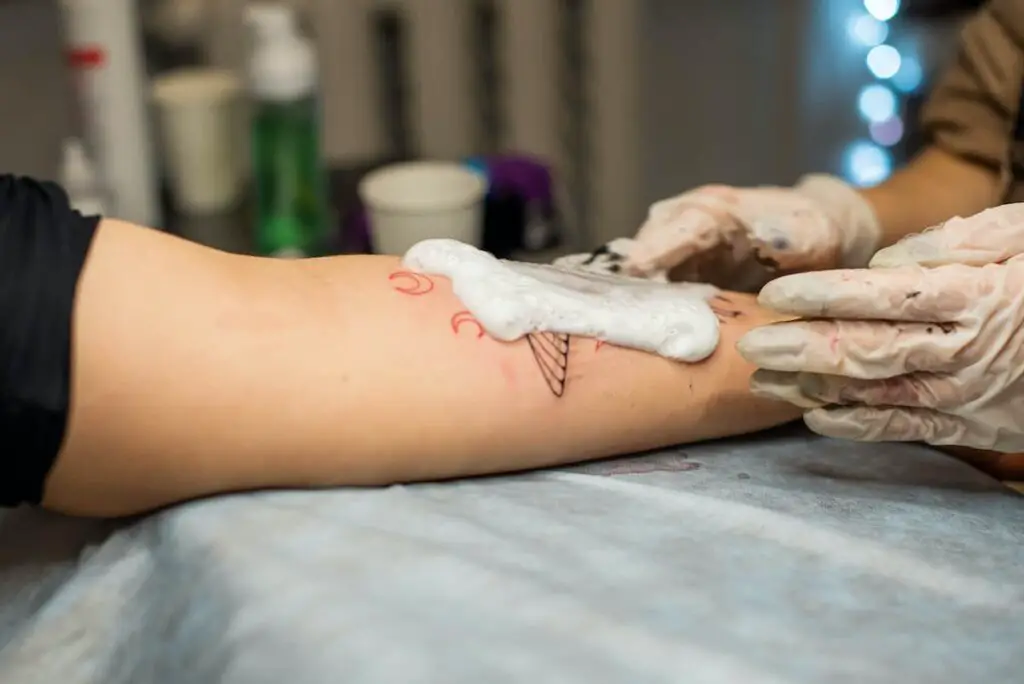
Safety and health regulations are essential parts of being a successful tattoo artist. As a tattoo industry professional, you must adhere to all relevant regulations. This not only provides the safety of your customers but also protects you from potential legal action should something go wrong during a procedure.
Keeping abreast of any newly enacted or revised laws within your region is vital to ensure your shop is always compliant. Top priority should also be given to making your work environment hygienic and secure for your clients and yourself. This includes routine sterilization of equipment, proper disposal of needles after each use, and facilitating adequate ventilation for proper airflow.
Acquiring written consent from clients under the age of 18 before starting a procedure is also important. This measure ensures that all parties involved are aware of the associated risks and can make an informed decision to proceed.
By adhering to these guidelines and staying informed about local regulations, you can operate your compliant business with confidence.
Blood-Borne Pathogens Certifications
Securing blood-borne pathogens certification is fundamental to being a safe and reputable tattoo artist. As an industry professional, it’s your obligation to ensure that you possess the appropriate certifications and a thorough understanding of safe blood-borne pathogen handling.
You must undergo blood-borne pathogen training and pass a certification exam to obtain certification. The course will provide an overview of disease transmission and safety measures for handling bodily fluids and blood. You will also receive instructions on proper equipment sanitization and disposal methods.
After completing the course, it’s crucial to maintain your certification by attending continuing education classes or seminars annually. This helps to guarantee that your knowledge remains current, enabling you to offer safe services to your clients while safeguarding your own well-being.
How Much Does a Tattoo Artist Make?
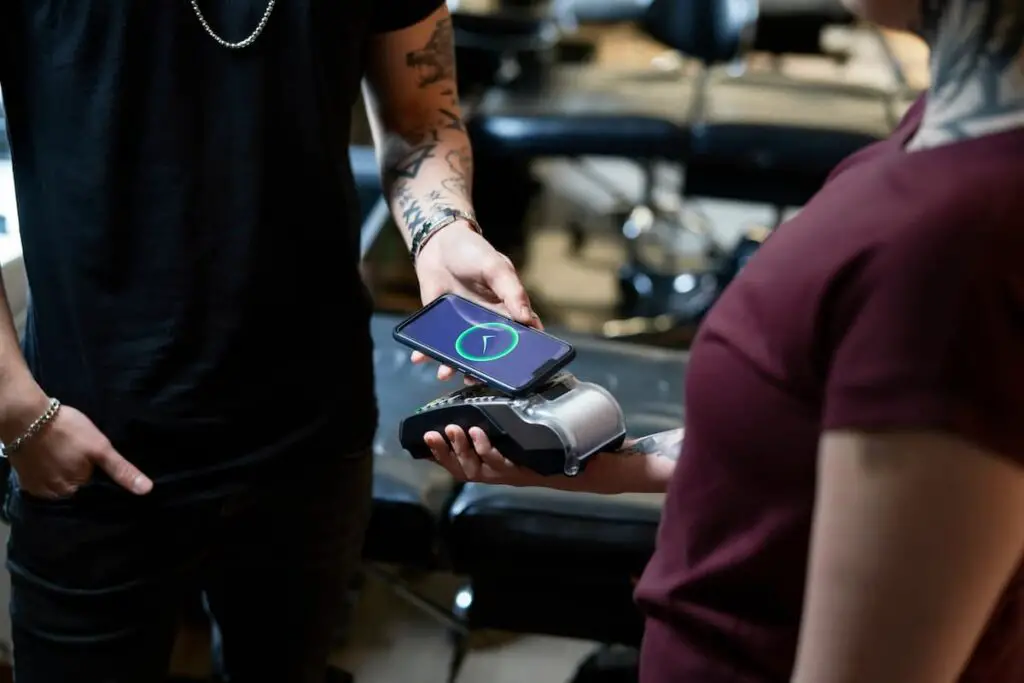
Tattoo artistry can be a lucrative career for those passionate about the craft. The average national annual salary for tattoo artists is approximately $50,000. Remember that this amount can vary based on skill level, location, and demand for services.
Many tattoo artists work on a commission when beginning their careers, receiving a percentage of each tattoo’s cost. With time, experience, and a growing client base, artists can raise their prices and earn higher commissions.
In addition to commission-based earnings, tips from satisfied customers are a significant source of income for some tattoo artists. The amount of gratuity depends on factors such as the design’s complexity and size and the client’s satisfaction with the final product.
Overall, becoming a tattoo artist could be extremely lucrative if you have an eye for detail and artistic talent. With dedication and hard work, there’s no limit to how much money you can make!
For a deeper dive into this topic, read our blog post, How Much Do Tattoo Artists Make?
Wrapping Up How To Become A Tattoo Artist
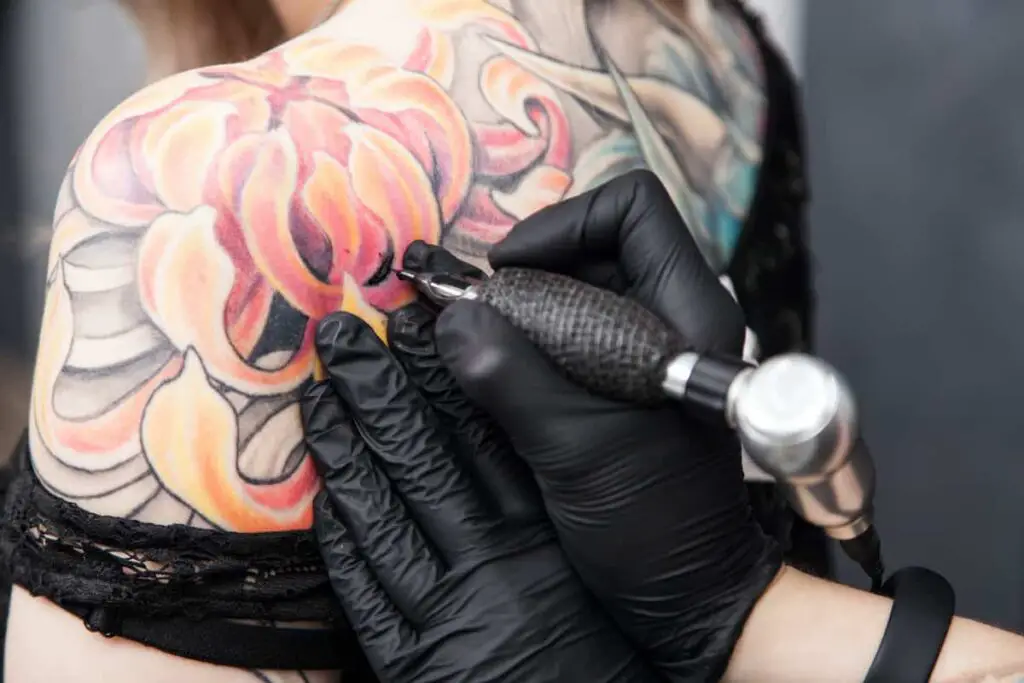
Becoming a professional tattoo artist takes more than just desire and artistic skill. Creative talent, technical proficiency, and an understanding of safety protocols and regulatory standards are necessary.
Following the steps outlined in this guide, from obtaining appropriate training and licensure to staying abreast of local requirements and industry trends, you can take off on a fulfilling career in tattoo artistry. You can establish yourself as a reputable and sought-after tattoo artist with determination, practice, and passion.
If you are ready to dive into the world of tattoo artistry, learning the different tattoo styles is a great place to start.

